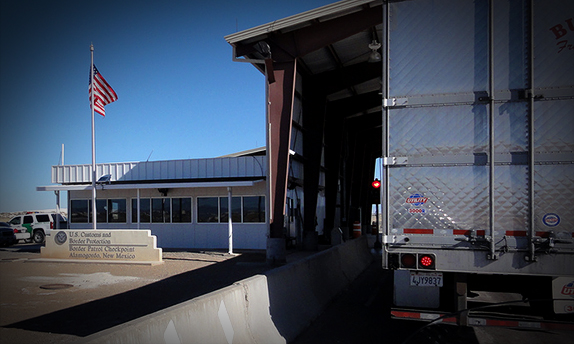
Driving on 1-25 north of Las Cruces, New Mexico, motorists are forced to detour through a U.S. Border Patrol checkpoint set up to enforce immigration and drug laws. Often, a friendly agent will ask the vehicle occupant (s) to affirm U.S. citizenship status before sending the traveler on his or her way. Occasionally, agents will simply peer into a car and wave travelers on without first asking questions.
Officers can also ask more detailed questions, inquiring about the motorist’s background and comings and goings. Other times, drivers are asked to pull over for a vehicle search that might include a go-over by a dope-sniffing dog.
On Wednesday, March 19, travelers heading north on 1-25 encountered another checkpoint for the first time ever: the “Know your Rights Checkpoint” organized by the American Civil Liberties Union (ACLU). Positioned just north of the official government checkpoint about 30 minutes from Las Cruces, staff from the ACLU’s New Mexico Regional Center for Border Rights, supported by community volunteers, greeted motorists at a scenic rest stop.
Under the New Mexico sun, the group hoisted signs, urged passerby to report alleged abuses and displayed literature at a table.
Brian Erickson, policy advocate for the Las Cruces-based regional center, told FNS that checkpoint staffers conversed with about a dozen people, mostly from Albuquerque, about individuals’ rights at Border Patrol checkpoints, which extend across a large swath of the U.S. Southwest.
“Interestingly a lot of people who stopped are people who don’t live in southern New Mexico, and are generally interested in what goes on at these (Border Patrol) checkpoints,” Erickson said in a phone interview. While none of the people who stopped at the ACLU’s informational checkpoint reported previous, negative interactions at Border Patrol highway checkpoints, many knew of people who had experienced “unwarranted searches” and other problems, Erickson said.
“It seemed like a lot of people weren’t clear about what rights they have at checkpoints,” he added. “It’s worth having a conversation how these impact our daily lives.”
The ACLU’s action grew out of concerns over racial profiling and rights infringements in what the civil liberties organization terms a “Constitution Free Zone” extending along the southern border with Mexico to 100 miles north, where Border Patrol agents are heavily deployed.
“Motorists in border communities report being stopped for unnecessary questioning, subjected to unwarranted searches and racially profiled,” said Alyssa Telander, ALCU-New Mexico Regional Center for Border Rights outreach coordinator, prior to the March 19 action. “We want to know the current extent of these practices in New Mexico.”
Erickson stressed that the Border Patrol and other law enforcement agencies enjoy great leeway in deciding who to search and what to ask, but that individuals also have the right to remain silent and/or not consent to a search. The civil liberties advocate said his office left a message with the Border Patrol’s regional headquarters in El Paso, Texas, informing the federal agency of the ACLU’s planned informational event on March 19.
Although unique to New Mexico, the 1-25 “Know Your Rights Checkpoint” was part of a larger campaign dubbed “Revitalize Not Militarize” and involving 60 non-governmental organizations that have banded together as the Southern Border Communities Coalition. Stretching border wide from Brownsville, Texas, to San Diego, California, the campaign supports investing in communities, improving the quality of life, passing comprehensive immigration reform, and stimulating the economy in order to “move forward together.”
Erickson said the ACLU-New Mexico Regional Center for Border Rights would consider additional “Know Your Rights” events as part of the movement to safeguard constitutional and civil rights, including on high-volume traffic days like Memorial Day weekend when thousands of people pass through the Border Patrol’s 1-25 checkpoint while on the road to holiday fun at New Mexico’s Elephant Butte Reservoir.
“We’re definitely going to look at doing these checkpoints more,” he said.
(Photo by Denver Gingerich)



Responses to “The ACLU’s Border Checkpoint”